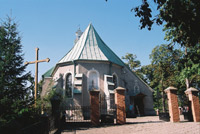Płonne
| Fryderyk Chopin used to visit this village very often (it is located only 2 km away from Szafarnia). During Chopin’s holiday visit in Szafarnia in the years 1824 – 1825, the local manor house was inhabited by General Dominik Dziewanowski, the senior member of the Dziewanowski family and a great-grandfather to Domuś, Chopin’s friend. |  |
The village was mentioned for the first time in 1322, in the 14th century it belonged to the Kretkowski family, in the second half of the 17th century it belonged to the Ziemiecki family for a short period of time and from the beginning of the 18th century until 1818, i.e. for the period of approximately 100 years, it was owned by the Dziewanowski family. In 1818 General Dominik Dziewanowski (†1827) sold the village of Płonne to Jan Melchior Piwnicki, who had his property seized by occupants due to his active participation in the November Uprising. As a result of the auction held in 1839, Ignacy Łempicki became the new owner of the village of Płonne, which was in the possession of his family until 1939. On the hill over the stream and on the way from Szafarnia to Wąpielsk there is a small St. James’s Parish Church dating back to the beginning of the 15th century. Numerous reconstructions left the church with no distinct characteristics of the Gothic style (its portals and buttresses). On the southern side of the church and near the presbytery there is an obelisk commemorating Jan Nepomucen Dziewanowski (1782-1808), a brother to Ignacy Dziewanowski of Szafarnia, the commander of the 3rd company of the 1st Light Cavalry Regiment of the Guards, who died of wounds suffered during the attack in the battle of Somosierra north of Madrid, Spain. Shortly after the battle, his family founded a three-sided obelisk to the hero in the area of the old cemetery in the village of Płonne. The obelisk was gradually destroyed, however, owing to efforts of Adolf Sulikowski, a patron, and Ludwik Łempicki, a new monument was founded in 1925. The monument is located near the church and bears description of the hero’s actions and a citation by Napoleon concerning virtues of his Polish subordinates.
Jan Nepomucen Dziewanowski was born in the village of Płonne in 1782 and he was probably taught in the years 1798 - 1799 by Mikołaj Chopin, Fryderyk’s father. On 14.04.1807 Jan N. Dziewanowski held Ludwika, the oldest child of Mikołaj and Justyna Chopin, during the baptismal ceremony in the Church of the Visitation of the Most Blessed Virgin Mary in Nowe Miasto District in Warsaw. Approximately 200 m north-west of the church, there is an outbuilding and a partly ruined manor house dating back to the second half of the 19th century. It is not located in the site of the old wooden manor house of the Dziewanowski family and Piwnicki family and it belonged to the Łempicki family before the Second World War. Around the manor house there is still a well preserved park with the area of 2.9 ha with its monumental larch trees and a unique storied tower and a fragment of the former brick-wall fence.
In the years 1926 - 1935 Maria Dąbrowska, a writer, visited the village of Płonne four times (staying there for the total period of 7 weeks) and gathered materials for her novel entitled ”Noce i dnie“ ("Nights and Days”). Initially, she stayed with her sister Helen and Stanisław Hepke, her brother-in-law, and later she stayed with the Chmielewski family. At the gate to the primary school in Płonne there is a commemorating plate of the writer placed on a large stone (6.5 m in circumference).
On the hill overgrown with trees and bushes south to the church, there is an untended cemetery. In the western part of the cemetery there is a brick there is a tomb of the Łempicki family and further to the south there is a wide tomb of unknown persons. The tomb features a tall figure of a monk (supposedly the Saint Stanisław Kostka) holding a cross and skull in his hands. Behind, there is a tomb of the Rudowski family with a plate commemorating Ludwika Rudowska of Tomkowo (†1912). A ground route leads us further to the south-east and the village Rętwiny.
Developed by: Andrzej Hermann
See other localities on the Fryderyk Chopin Route in the Kujawsko-Pomorskie Province
Angielski
Tytuł:
Płonne


